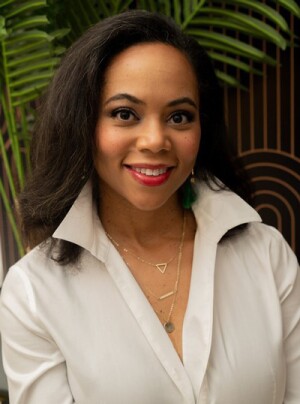Armed with a determination to help provide resources and address the racial wealth gap, Latresa McLawhorn Ryan walks the talk. Now the former founding executive director and first employee at the Atlanta Wealth Building Initiative is embarking on a new venture as founder of Atlanta-based Blackbird Strategy Group. Here she shares insights on using real estate to close the racial wealth gap and advance economic security for Black and brown communities.
Urban Land recently spoke to her about this and other topics.
UL: How can real estate be used to help close the racial wealth gap?
Latresa McLawhorn Ryan: Residential real estate has long been a tool to build generational wealth. As an example, 45 million Americans still benefit from the Homestead Act today, which was established to provide 160 acres of public land, which forced Indigenous Americans from land they held for centuries, to provide an economic mobility engine largely for white Americans. Freed slaves, which were relatively few people at the time, technically qualified, but the Act specifically excluded 2 occupations—agricultural workers and domestic servants, largely preventing freed Black Americans from using this tool of social welfare to establish economic security and wealth. Accordingly, due to historical and structural policies, Black and brown people were largely excluded from that process due to discrimination in the way that the program was implemented.
UL: How are communities impacted when it comes to a pandemic or another major shift in the market?
Ryan: If the cost of your real estate or office space or commercial warehouse space is static, you can plan for that differently. You can control for the management of those outcomes. But if you are at the will of a landlord who may sell without giving you an opportunity to purchase and, therefore, your business is displaced, if there are large-scale rent increases over time, that would impact your projected revenue. You have less of an opportunity to plan for that and to build your business.
UL: What else are developers of color experiencing that is hindering their efforts to be successful in commercial real estate?
Ryan: Another important opportunity is the ability to more openly and fairly participate in the development of commercial real estate and developing successful companies that have the access to capital needed to compete and participate in large-scale deals. There’s an opportunity there that we can close the racial wealth gap. There’s also an opportunity given the current policies. For example, Black developers are often limited to affordable residential real estate transactions versus participating in large-scale commercial development. Opening up opportunities for more Black and brown business owners to participate allows them to also impact the development of their community.
UL: Are there real estate development funds at the institutional level that are earmarking dollars to close the racial wealth gap?
Ryan: Absolutely. JP Morgan through its Entrepreneurs of Color Fund has done that in various communities across the country. It’s specific to commercial real estate. There are partners like Prudential that has a very ecosystem centered approach to their interaction with the community and real estate is a part of that. The Rockefeller Foundation has participated or has funds set aside for that. Fifth Third Bank is another. In Atlanta, for example, they have been an important partner for the Grove Park Foundation in building out that community. Additionally, I participated in designing a program with Wells Fargo to set aside a large amount of funding that addressed the need for affordable commercial real estate. That design and request centered around feedback we were receiving directly from the community who were business owners who were impacted and consistently being displaced from the communities where they built their companies.
So the idea is to create opportunities for businesses to both age in place as well as grow in place, which is really important as commercial centers become less affordable, and those legacy businesses are forced to move further out to continue their businesses. NCRC’s community development fund is an outstanding example as well. It’s a Community Development Fund, that it is really, in my opinion, the premier example of equitable community-centered CDFI funding. LISC also has a fund centered around commercial real estate and providing opportunities for businesses to own their property and grow and build upon their property.
UL: What do people need to keep in mind overall when it comes to creating opportunities in commercial real estate?
Ryan: Real estate can be a great equalizer and a great divider. Anyone who has purchased real estate or developed real estate has likely seen that firsthand. As projects are built and completely transform neighborhoods for the better, more amenities are provided. It sparks economic growth, in general, for communities, but this opportunity needs to be community centered and inclusive about that practice, creating equitable opportunities to participate but also equity requires opportunities for communities to give voice to what that looks like.
EDITOR’S NOTE: If you would like to become involved in or sponsor ULI’s DEI efforts, please visit our website http://americas.uli.org/dei. And if you would like to see the progress ULI has made so far, you can access our 2022 annual report.






